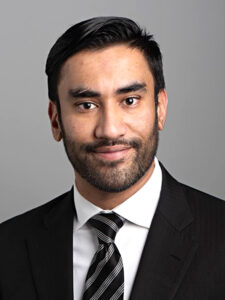 Title: Assistant Professor
Title: Assistant Professor
Company: State University of New York at Buffalo
Location: Buffalo, New York, United States
Education: PhD, Jacobs School of Medicine and Biomedical Sciences, State University of New York at Buffalo, Buffalo, NY (2020); ASC, School of Public Health and Health Professions, State University of New York at Buffalo, Buffalo, NY (2020); MD, Education Commission for Foreign Medical Graduates, U.S. Medical License Examination (2015); MBBS, Dow Medical College, Dow University of Health Sciences, Karachi, Pakistan (2014)
Director of Research, University Concussion Management Clinic and Research Center, UBMD Orthopedics and Sports Medicine, State University of New York at Buffalo, Buffalo, NY (2020-Present); Research Assistant Professor, Department of Orthopedics and Sports Medicine, State University of New York at Buffalo, Buffalo, NY (2019-Present); Graduate Assistant, University Concussion Management Clinic and Research Center, UBMD Orthopedics and Sports Medicine, State University of New York at Buffalo, Buffalo, NY (2017-2020); Clinical Research Coordinator, Department of Orthopedics and Sports Medicine, State University of New York at Buffalo, Buffalo, NY (2017-2019); Postdoctorate Clinical Research Fellow, University Concussion Management Clinic and Research Center, UBMD Orthopedics and Sports Medicine, State University of New York at Buffalo, Buffalo, NY (2015-2017); Psychiatry Resident, Civil Hospital, Karachi, Pakistan (2014-2015); Lecturer, Department of Pathology, United Medical and Dental College, Jinnah Sindh Medical University, Karachi, Pakistan (2014); Demonstrator for Advanced Trauma Care, Primary Trauma Foundation, Jinnah Postgraduate Medical Center, Karachi, Pakistan (2011-2014); Part-Time Lecturer of Basic Life Support, Advanced Traumatic Life Support, First Responder Course, First Response Initiative of Pakistan, Karachi, Pakistan (2011-2014)
Type of Business: Medicine
Mohammed Haider, Assistant Professor at State University of New York at Buffalo, has been recognized as a Marquis Emerging Leader for their contributions and achievements in the field of medicine, education and research.
Dr. Haider’s decision to go into first aid and trauma management began when he was in high school. Having gravitated to science and medicine, he pursued the field in his academic pursuits, earning an MBBS at Dow Medical College at the Dow University of Health Sciences in Karachi, Pakistan in 2014, and received an MD from the Education Commission for Foreign Medical Graduate through the U.S. Medical License Examination in 2015. In 2020, he received both an ASC from the School of Public Health and Health Professions and a PhD from the Jacobs School of Medicine and Biomedical Sciences at the State University of New York at Buffalo. Dr. Haider’s medical career began in Pakistan, where he was a lecturer of basic life support with the First Response Initiative of Pakistan from 2011 to 2014. During that same time, he served as a demonstrator with the Trauma Foundation at the Jinnah Postgraduate Medical Center. He was a lecturer for the Jinnah Sindh Medical University in 2014 and served as a psychiatry resident at the Civil Hospital in Karachi from 2014 to 2015. From 2017 to 2019, he served as a clinical research coordinator for the institution and then went on to be a graduate assistant.
In 2015, Dr. Haider resumed his career upon relocating to the United States, starting as a postgraduate clinical research fellow with the University Concussion Management Clinic and Research Center for the UBMD Orthopedics and Sports Medicine at SUNY Buffalo. Since 2019, Dr. Haider has served as a research assistant professor at SUNY Buffalo, and in 2020, took on the additional role as Director of Research for the University Concussion Management Clinic and Research Center at the institution.
The highlight of Dr. Haider’s career thus far has been conducting early exercise as a treatment for concussions and, in 2019, publishing their first trial proving early rehabilitation and diagnosis of a concussion pathology. This line of research has been the main focus of his work. Dr. Haider attributes his success to his drive to work and overcome his disability as he had multiple sclerosis. He hopes to get the word out for people to know that with multiple sclerosis it was about facing his disability, overcoming it, or working around it which was the most important thing to him outside of work. He did not let his disability overtake him. In five years, Dr. Haider plans to excel in his field for concussion-related research. His goal is to be the world leader in cerebral blood flow regulation after brain injuries.

